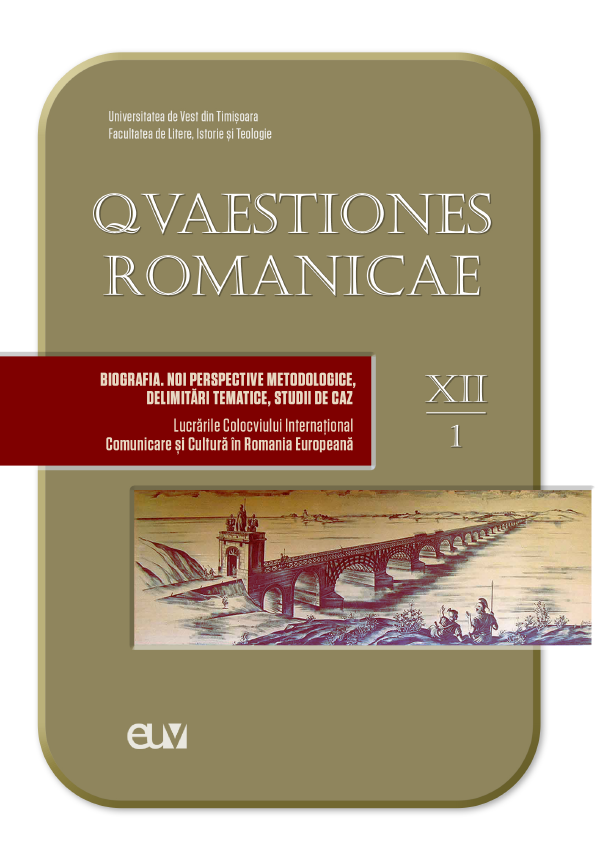L’(auto)biographie (re)valorisée par la littérature contemporaine : les récits de filiation de Jean-Luc Coatalem
Abstract: (The (auto)biography (re)valued by contemporary literature: Jean-Luc Coatalem’s filiation narratives) (Auto)biography has always been the path followed by writers to depict the lives of others, as well as their own existence. In relation with society, literature is constantly evolving, changing form and content, while reflecting outside reality. This article will examine the direction of contemporary literature at the turn of the 1980s, when critics took note of an aesthetic production that existing theories were unable to define. This orientation paved the way for an unprecedented modernity, reinvesting and re-evaluating the concept of the traditional (auto)biography. Among these variations, we will focus on the notion of filiation narrative through the work of Jean-Luc Coatalem. We will approach this form as a mutation of (auto)biography, without considering it as a breach of previous written literature, but rather as an inflection and revaluation of (auto)biographemes. By selecting three narratives of filiation, namely Suite indochinoise: Récit de voyage au Vietnam [Indochina Suite: The story of a journey to Vietnam] (1999), Le dernier roi d’Angkor [The last king of Angkor] (2010) and La part du fils [The son’s heritage] (2019), we will explore the dimensions of an (auto)biographical approach engaged by Coatalem, who dedicates his stories to little-known, anonymous individuals. In addition, the selected corpus will enable us to illustrate the inflections of this literature, which, instead of focusing on the outstanding figures of history, concentrates on marginal, obscure family existences, through a double challenge: biographical (history seeks to restitute these modest figures) and autobiographical (the story of the Other ultimately turns out to be an autoscopy).
Keywords: Jean-Luc Coatalem, (auto)biography, filiation narratives, history of the Other, history of the Self.
Résumé : L’(auto)biographie a toujours été la voie empruntée par les écrivains pour faire le récit de la vie de l’Autre, mais aussi de leur propre vie. En relation avec la société, la littérature est constamment en évolution, changeant de forme et de contenu, en reflétant les réalités extérieures. Dans le présent article, nous allons nous pencher sur la tendance manifestée par la littérature contemporaine, au tournant des années 1980, lorsque la critique a pris acte d’une production esthétique que les théories existantes ne parvenaient pas à définir. Cette orientation ouvre la voie à une modernité sans précédent, réinvestissant et réévaluant le concept d’(auto)biographie traditionnelle. Parmi ces variations, nous nous concentrerons sur la notion de récit de filiation à travers l’écriture de Jean-Luc Coatalem. Nous allons traiter cette forme en tant que mutation de l’(auto)biographie, sans la considérer comme une rupture avec la littérature écrite avant, mais plutôt comme une inflexion et une revalorisation des (auto)biographèmes. En choisissant trois récits de filiation, à savoir Suite indochinoise : Récit de voyage au Vietnam (1999), Le dernier roi d’Angkor (2010) et La part du fils (2019), nous explorerons les dimensions d’une démarche (auto)biographique entreprise par Coatalem, qui consacre ses histoires à des individus menus, restés sous anonymat. De plus, le corpus sélectionné nous permettra d’illustrer les inflexions de cette littérature qui, au lieu de s’intéresser aux figures marquantes de l’Histoire, se concentre sur des existences familiales marginales, floues, à travers une double visée : biographique (l’histoire cherche à restituer ces figures modestes) et autobiographique (le récit de l’Autre se révèle finalement être une autoscopie).
Mots-clés : Jean-Luc Coatalem, (auto)biographie, récit de filiation, histoire de l’Autre, histoire de Soi.
